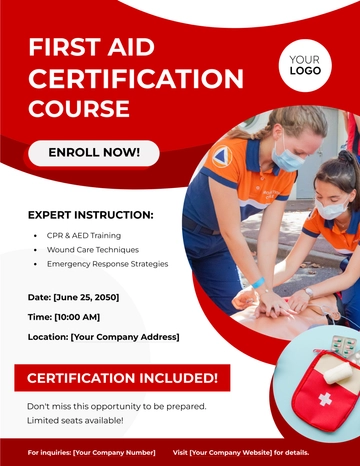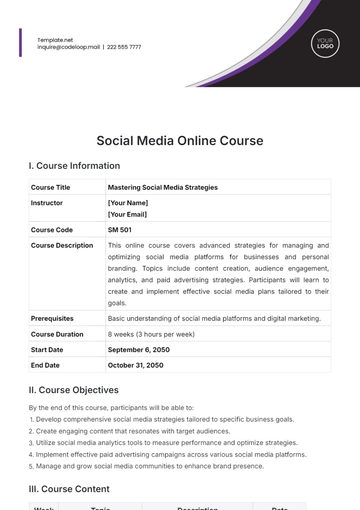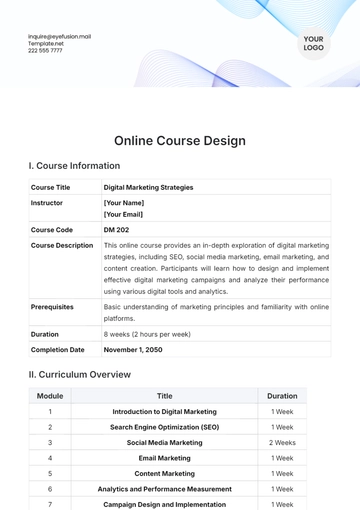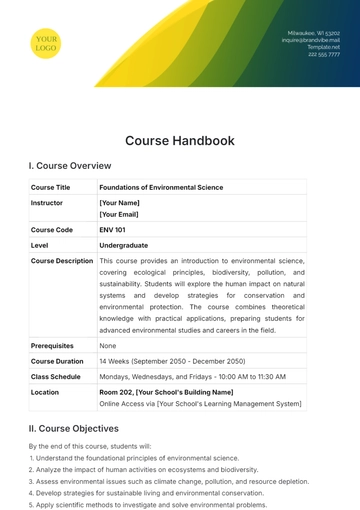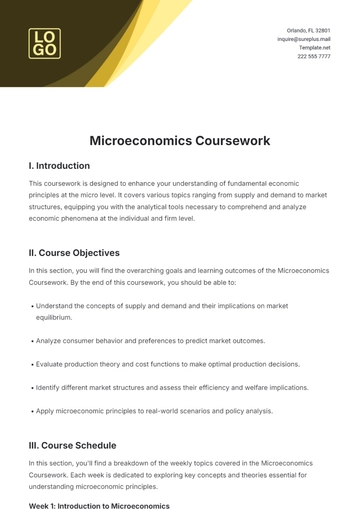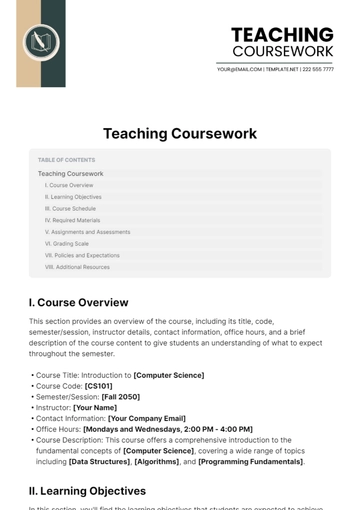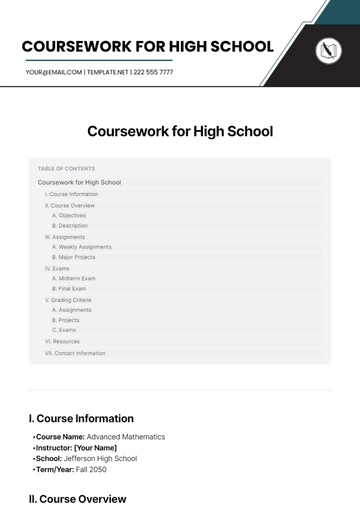Free Course Educational Brief
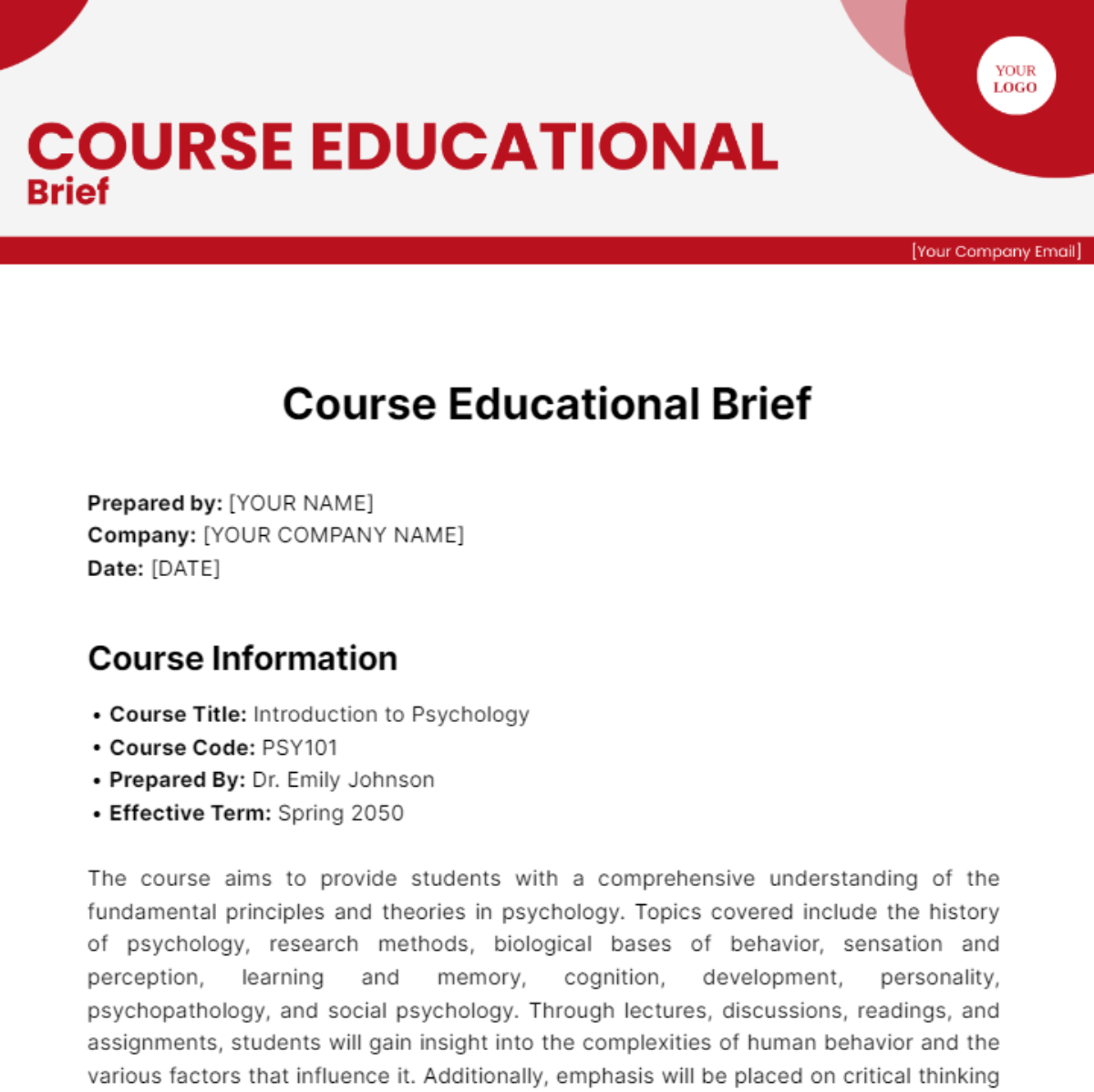
Prepared by: [YOUR NAME]
Company: [YOUR COMPANY NAME]
Date: [DATE]
Course Information
Course Title: Introduction to Psychology
Course Code: PSY101
Prepared By: Dr. Emily Johnson
Effective Term: Spring 2050
The course aims to provide students with a comprehensive understanding of the fundamental principles and theories in psychology. Topics covered include the history of psychology, research methods, biological bases of behavior, sensation and perception, learning and memory, cognition, development, personality, psychopathology, and social psychology. Through lectures, discussions, readings, and assignments, students will gain insight into the complexities of human behavior and the various factors that influence it. Additionally, emphasis will be placed on critical thinking skills, ethical considerations in psychological research, and practical applications of psychological principles in everyday life.
Course Objectives
To familiarize students with the foundational concepts, theories, and methods in psychology.
To develop students' critical thinking skills through the analysis and evaluation of psychological research studies and findings.
To explore the biological, cognitive, emotional, and social factors that influence human behavior and mental processes.
To understand the principles of research design and methodology used in psychology and apply them to the formulation of research questions and hypotheses.
To examine the developmental processes across the lifespan and the factors that contribute to individual differences in behavior and psychological functioning.
To investigate the major theories of personality and assess their implications for understanding individual differences and behavior patterns.
To identify common psychological disorders, their symptoms, etiology, and treatment approaches, as well as the impact of psychological disorders on individuals and society.
To explore the role of social interactions, group dynamics, and cultural influences in shaping behavior attitudes, and perceptions.
To promote self-awareness and understanding of one's psychological processes and behavior through reflection and application of psychological concepts to personal experiences.
To encourage ethical awareness and responsible behavior in the application of psychological knowledge and principles in various contexts, including personal, professional, and societal domains.
Course Outline
Week | Topic | Key Learning Outcomes |
|---|---|---|
Week 1 | Introduction to Psychology |
|
Week 2-3 | Biological Bases of Behavior |
|
Week 4-5 | Sensation and Perception |
|
Week 6-7 | Learning and Memory |
|
Week 8-9 | Cognition and Intelligence |
|
Week 10-11 | Developmental Psychology |
|
Week 12-13 | Personality Theories |
|
Week 14-15 | Psychopathology and Therapy |
|
Week 16 | Social Psychology |
|
Week 17 | Applications of Psychology |
|
Methodology and Assessment
Methodology:
Lectures: Engaging lectures will be delivered to introduce key concepts, theories, and research findings in psychology. Lectures will be supplemented with multimedia presentations, case studies, and real-world examples to enhance understanding and application.
Discussions: Interactive discussions will be facilitated to encourage critical thinking, active participation, and the exchange of ideas among students. Topics covered in lectures will be explored further through group discussions, debates, and collaborative activities.
Readings: Assigned readings from the textbook and supplementary materials will complement lectures and discussions, providing students with additional insights and perspectives on psychological concepts and research.
Experiential Learning: Hands-on activities, demonstrations, and experiments will be conducted to illustrate psychological principles and phenomena, allowing students to experience and observe concepts in action.
Assessment:
Quizzes: Weekly or bi-weekly quizzes will assess students' understanding of the material covered in lectures, readings, and discussions. Quizzes may include multiple-choice, short-answer, or essay questions.
Assignments: Written assignments will be assigned to evaluate students' comprehension, critical thinking, and analytical skills. Assignments may include literature reviews, research critiques, case analyses, and essay questions.
Exams: Midterm and final exams will assess students' mastery of the course material, including key concepts, theories, and research methods in psychology. Exams may consist of multiple-choice, short-answer, and essay questions.
Group Projects: Collaborative projects will provide students with the opportunity to apply psychological principles to real-world scenarios, conduct research, and present their findings to the class. Group projects may include research proposals, experimental designs, and presentations.
Participation: Active participation in class discussions, activities, and group work will be evaluated based on students' contribution to the learning environment, engagement with course material, and respectful interaction with peers and the instructor.
Attendance: Regular attendance and punctuality will be expected and may factor into the overall assessment of student performance in the course.
Textbooks and Resources
Primary Textbook:
"Psychology: Themes and Variations" by Wayne Weiten and Doug McCann (12th Edition)
This comprehensive textbook covers a wide range of topics in psychology, including biological bases of behavior, sensation and perception, learning and memory, cognition, development, personality, psychopathology, and social psychology. It provides in-depth explanations, examples, and applications of key concepts and theories.
Supplementary Readings:
"Thinking, Fast and Slow" by Daniel Kahneman
This book explores the cognitive processes underlying decision-making and judgment, drawing on insights from psychology and behavioral economics.
"The Man Who Mistook His Wife for a Hat" by Oliver Sacks
A collection of case studies that offer fascinating insights into various neurological disorders and their effects on behavior and perception.
"The Power of Habit: Why We Do What We Do in Life and Business" by Charles Duhigg
This book delves into the science of habit formation and explores how habits shape our behavior and daily routines.
Online Resources:
American Psychological Association (APA) website: Provides access to a wide range of resources, including research articles, guidelines for ethical conduct in research and practice, and information on various subfields of psychology.
TED Talks: Features engaging talks by experts in psychology and related fields, covering topics such as happiness, motivation, behavior change, and mental health.
Psychology Today website: Offers articles, blogs, and resources on various psychological topics, including therapy, relationships, and personal development.
Journals and Research Articles:
Journal of Experimental Psychology: Publishes research articles on experimental studies in psychology, covering topics such as perception, cognition, learning, and memory.
Developmental Psychology: Focuses on research related to child and adolescent development, including cognitive, social, and emotional aspects.
Journal of Abnormal Psychology: Publishes research on the etiology, diagnosis, and treatment of psychological disorders, as well as studies on abnormal behavior and psychopathology.
Online Databases:
PsycINFO: A database of psychological literature, including journal articles, books, and dissertations, covering a wide range of topics in psychology and related fields.
PubMed: Provides access to biomedical literature, including research articles in psychology, neuroscience, and related disciplines.
These textbooks and resources will serve as valuable tools for students to deepen their understanding of psychology, explore diverse perspectives, and engage with current research in the field.
Policies and Expectations
Attendance: Regular attendance is expected for all class sessions. Attendance will be taken at the beginning of each class, and excessive absences may impact your final grade. If you are unable to attend class due to illness or other valid reasons, please notify the instructor in advance.
Participation: Active participation in class discussions, activities, and group work is essential for your learning experience. Be prepared to contribute to class discussions, ask questions, and engage with the material presented. Respectful interaction with peers and the instructor is expected at all times.
Assignment Submission: Assignments must be submitted by the specified deadline. Late submissions may incur a penalty unless prior arrangements have been made with the instructor. It is your responsibility to plan and manage your time effectively to meet assignment deadlines.
Academic Integrity: Academic integrity is of utmost importance. Plagiarism, cheating, and other forms of academic dishonesty will not be tolerated and will result in severe consequences, including a failing grade for the assignment or the course. All work submitted must be your original work, properly cited when necessary.
Respectful Behavior: Respectful and professional behavior is expected in all interactions within the classroom and online discussions. Disruptive behavior, including but not limited to rudeness, harassment, or offensive language, will not be tolerated and may result in disciplinary action.
Technology Use: The use of electronic devices, such as laptops, tablets, and smartphones, is permitted for educational purposes only. Please refrain from engaging in unrelated activities (e.g., browsing social media) during class time, as it can be distracting to yourself and others.
Feedback and Communication: Your feedback is valuable in improving the course and the learning experience. Feel free to communicate any concerns or suggestions to the instructor in a respectful manner. The instructor will also provide feedback on your performance and progress throughout the course.
Accommodations: If you require accommodations for a documented disability, please contact the instructor as soon as possible to make appropriate arrangements. Accommodations will be provided by university policies and procedures.
Emergency Procedures: Familiarize yourself with the emergency procedures for the classroom and the campus. In the event of an emergency, follow the instructions provided by the instructor or university staff to ensure your safety and well-being.
By adhering to these policies and expectations, you will create a positive and conducive learning environment for yourself and your peers. If you have any questions or concerns about any of the policies outlined above, do not hesitate to reach out to the instructor for clarification.
Other Important Information
Other Important Information:
Office Hours: The instructor will hold regular office hours each week, during which you can ask questions, seek clarification on course material, and discuss any concerns you may have. Office hours provide an opportunity for one-on-one interaction with the instructor and are highly encouraged.
Communication Channels: Communication with the instructor may occur via email, in person during office hours, or through the course management system (e.g., Canvas, Blackboard). Check your university email regularly for important announcements, updates, and reminders related to the course.
Extra Help and Resources: If you need additional help understanding course material or preparing for exams, consider utilizing tutoring services, study groups, or academic support resources offered by the university. The instructor may also recommend supplementary materials or resources to aid in your learning.
Feedback Mechanisms: Your feedback is valuable in improving the course and instructional methods. Throughout the semester, you may be asked to provide feedback through surveys, evaluations, or informal discussions. Your input will be taken into consideration to enhance the learning experience for future students.
Flexibility and Adaptability: The instructor recognizes that students may have diverse backgrounds, learning styles, and commitments outside of the classroom. If you encounter challenges or require accommodations, please communicate with the instructor as soon as possible to discuss possible solutions and adjustments.
Emergency Contact Information: In the event of an emergency or unexpected class cancellation, the instructor will provide instructions on how to proceed via email or through the course management system. Ensure that your contact information is up to date and accessible to receive important notifications.
Course Schedule Changes: Occasionally, changes may be made to the course schedule, such as guest speakers, field trips, or adjustments to assignment due dates. The instructor will notify you of any changes in advance and guide how to adapt to the revised schedule.
Celebrating Diversity and Inclusion: This course values diversity, equity, and inclusion. Respect for different perspectives, backgrounds, and experiences is essential for fostering a supportive and inclusive learning environment. Discrimination, harassment, or bias of any kind will not be tolerated.
Self-Care: Remember to prioritize your well-being and mental health throughout the semester. Practice self-care strategies, such as maintaining a balanced schedule, getting enough rest, and seeking support when needed. Your health and well-being are paramount to your academic success.
By staying informed and proactive, you can navigate the course effectively and make the most of your learning experience. If you have any questions or require further assistance, do not hesitate to reach out to the instructor or university resources for support.
Contact Information for Support
Please feel free to get in touch in case of any queries or doubts at [insert preferred mode of communication]
This Course Outline is subject to change. Any changes will be communicated promptly.
This course will offer a blend of traditional teaching components and innovative pedagogical approaches to enhance and embody the brand's unique identity.
- 100% Customizable, free editor
- Access 1 Million+ Templates, photo’s & graphics
- Download or share as a template
- Click and replace photos, graphics, text, backgrounds
- Resize, crop, AI write & more
- Access advanced editor
Introducing the Course Educational Brief Template from Template.net – your comprehensive guide for course planning and development. Customizable and editable, it simplifies outlining course objectives, curriculum, and assessment methods. Seamlessly editable in our Ai Editor Tool, ensuring precision and clarity in every detail. Elevate your course planning with this tool crafted to streamline organization and enhance educational effectiveness.


















